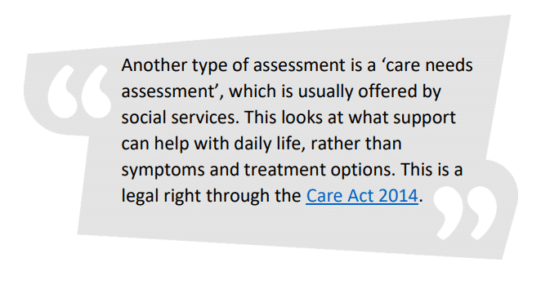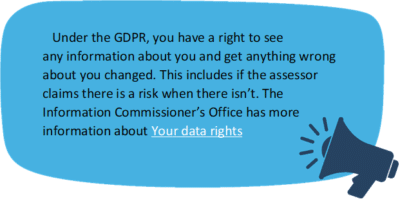.
One of the biggest barriers people face with accessing treatment for their OCD is lack of recognition of their symptoms. Someone might not be completely open about them to professionals because they are embarrassed, or the assessor themselves might not be aware of the different ways OCD can manifest. Taking part in an assessment with a knowledgeable practitioner and with some preparation can help to open doors to the right support.
What is an assessment?
The word assessment is used throughout the mental health system and can mean different things depending on what is being assessed and why. In general, the aim of a mental health assessment is to evaluate what symptoms you are struggling with, how much these are impacting on your life and wellbeing, and what your needs are.
There are two main reasons someone might be assessed for symptoms of OCD or related condition within the NHS.
If you are referred to a mental health service, a professional from the team will make an assessment about whether you are in the right place and which of their services might be most appropriate. This might be done by a psychologist, therapist, or mental health nurse.
After the assessment, you should be told whether you have been put on a waiting list, what symptoms you described, and what treatment you will be offered. If you have described symptoms of OCD, you should be put on a waiting list for CBT with ERP. You might be told it’s for general ‘psychological treatment’. This means you will be working with a psychologist who will adapt the therapy based on your symptoms. In this case it can help to remind the service that it should be someone with training in both OCD and ERP, as recommended by the guidelines. You can ask them to add this to your notes so that everyone is aware of it once you’ve made your way through the waiting list.
If you need a medical diagnosis, you should be referred to a psychiatrist, who will do a more in-depth assessment with the aim of defining what exactly you are struggling with and need. This is a separate and one-off appointment, so you won’t necessarily be put on a waiting list for treatment as a result of it. At the end of it you should be given a report with a diagnosis and recommendations for treatment and support.
This is usually only necessary if there is a question about what condition/s you are struggling with. For example, if someone restricts what they eat, the treatment will be different depending on the reason why – it could be OCD (‘The food is contaminated’), autism (‘The texture is upsetting’), an eating disorder (‘I will get fat if I eat’), or any number of other challenges. A diagnosis might be sought, in this case, so that the person receives the right treatment for their symptoms.
Do I need a diagnosis?
You don’t need to be diagnosed by a psychiatrist in order to receive the appropriate treatments. Treatment will be offered based on what symptoms are describing, so you will be able to access it as long as you speak to a professional who can recognise OCD. If the assessor doesn’t have any expertise in OCD, you can ask to be seen by someone who does or provide information from our website.
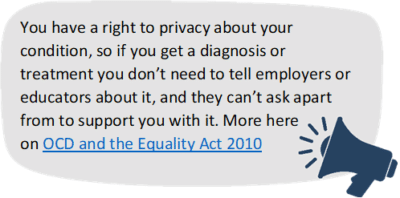 In some situations it might be useful to have a diagnosis, even though it isn’t necessary. For example, when asking for disability support at work or if your new GP doesn’t know much about OCD. In these cases, you don’t need a formal diagnosis from a psychiatrist, and instead can use notes from your medical record, which will have information about previous assessments and what treatment you’ve had . There is usually some mention of ‘symptoms of OCD’, either from an assessment or because you were offered treatment for them.
In some situations it might be useful to have a diagnosis, even though it isn’t necessary. For example, when asking for disability support at work or if your new GP doesn’t know much about OCD. In these cases, you don’t need a formal diagnosis from a psychiatrist, and instead can use notes from your medical record, which will have information about previous assessments and what treatment you’ve had . There is usually some mention of ‘symptoms of OCD’, either from an assessment or because you were offered treatment for them.
If seeing a professional privately, you don’t need a diagnosis, but should instead focus on finding a therapist with the right training. A report of symptoms from a private psychologist or therapist might not be recognised formally, as these credentials don’t qualify someone to provide a medical diagnosis. A diagnosis from a private psychiatrist, though, is considered reliable because of the level of training they have, so should be recognised by any other service or professional.
What will an assessment look like?
As part of the assessment, you will be asked a number of questions. Some of these might not be about OCD specifically, but are still an important part of getting a clear picture of what you are experiencing and what can help.
At the start of an assessment, the professional should explain:
- What the assessment is for and what to expect
- What information they might share with others and under what circumstances
- That any decision about treatment will be made by you and healthcare professionals together
- That you can refuse permission for other members of staff to be present (for example, a student might be observing the session)
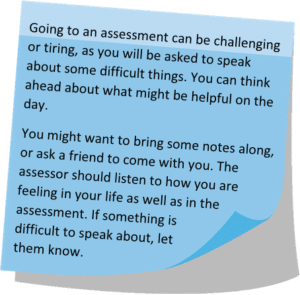 During the assessment, you should be given enough time to talk about your symptoms and how you are affected by them. There should also be time at the end for you to ask any questions. If you are given a diagnosis or your symptoms match a certain condition this should be clearly explained, and you should be provided with some written information about it. The healthcare professional should discuss different treatments and give information about each.
During the assessment, you should be given enough time to talk about your symptoms and how you are affected by them. There should also be time at the end for you to ask any questions. If you are given a diagnosis or your symptoms match a certain condition this should be clearly explained, and you should be provided with some written information about it. The healthcare professional should discuss different treatments and give information about each.
The three key things that an assessor will be looking to understand are:
- What your symptoms are
It is common for people with OCD and related conditions to find it difficult to talk about their symptoms. You might feel embarrassed by them or be worried about being misunderstood. In order to make sure that the assessment is accurate and that you are offered the treatment you need, though, it’s important to be honest and give a full account of what you are experiencing. This includes other conditions, as the treatment could be adapted to be more appropriate to your individual needs.
OCD is not defined by what obsessions are about or what compulsions might look like. The elements of the cycle can have infinite manifestations, and it is the cycle in itself that the assessor should be looking for. - How those symptoms are affecting your mental health and quality of life
Most people experience occasional obsessions and compulsions that make them anxious or in response to anxiety, but in order to be diagnosed as OCD these must be having a noticeable impact on your life. People who live with OCD find their symptoms intolerable and disabling. Common effects of OCD on mental health are high levels of anxiety, very low moods, fatigue, and feelings of shame, self-blame, or low confidence.
You might also be asked about suicidal thoughts or difficult childhood experiences to give more context on how the OCD symptoms are impacting you and what overall support to offer. - How those symptoms are affecting your day to day functioning
OCD is often kept hidden, at least as much as possible, by people struggling with it, but this does not mean that it doesn’t impact on the things they do. The assessor should ask about how much time and energy is taken up by your rituals and thoughts, because it is common for them to be happening in the background, taking up a big part of the day even though from the outside you seem to be getting on fine. You might avoid certain tasks, events, or situations in an attempt to manage your anxiety. You might find some tasks impossible, or harder than they should be because of all the rules you need to follow or how distracting your thoughts are.
Intrusive thoughts can be about any topic, though most often they are in some way related to danger, including someone worrying about whether they might hurt themselves or others. OCD can cause you to worry 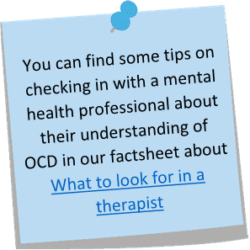 excessively about these intrusive thoughts and become obsessed with doubts about whether you might, for example, attack someone or be sexually attracted to children. The obsession is a fear of these things, and never a desire or sign of risk. A professional who has training and experience with OCD will understand this and would not report these thoughts as a safeguarding concern.
excessively about these intrusive thoughts and become obsessed with doubts about whether you might, for example, attack someone or be sexually attracted to children. The obsession is a fear of these things, and never a desire or sign of risk. A professional who has training and experience with OCD will understand this and would not report these thoughts as a safeguarding concern.
In fact, the NICE Guidelines state:
“If healthcare professionals are uncertain about the risks associated with intrusive sexual, aggressive or death-related thoughts reported by a person with OCD, they should consult mental health professionals with specific expertise in the assessment and management of OCD. These themes are common in people with OCD at any age, and are often misinterpreted as indicating risk.” (Page 45)
Doctors and health professionals might have different opinions about what you are experiencing or what you need. This is especially true for mental health. If you disagree with a decision about your diagnosis or treatment, you can ask for a second opinion. While this isn’t a legal right, it should be offered if you have a good reason for asking.
Before asking for a second opinion, it is important to make it clear to the doctor who made the first decision why you don’t agree with it. Giving more information, or 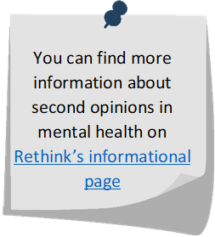 clearing up any information that might have been misunderstood, can give the doctor the opportunity to change their mind.
clearing up any information that might have been misunderstood, can give the doctor the opportunity to change their mind.
If this doesn’t work, you can ask to be assessed by another professional with as much or more expertise in the specific issue. There are a few specialist OCD services in the country, so if your OCD symptoms are quite complex or nuanced, you might be able to be seen there for a second opinion. Funding for this would have to be approved by your local health board.

